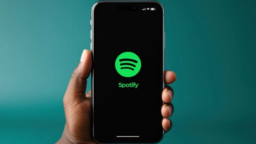Spotify is converting a higher percentage of its active audience to premium than ever before.
That news was compounded yesterday by Daniel Ek‘s official confirmation that the service has now surpassed the milestone of 30m paying customers.
But in the background, there’s a major headache plaguing Ek and his team.
It was brought sharply into focus by Coldplay at the end of last year.
But we’ve also seen it from the likes of The 1975, Future & Drake and, now, from Gwen Stefani: all blockbuster artists who have put their new material on Apple Music (and/or other paid services) on day one, but held it back from Spotify.
Stefani’s new album, This Is What The Truth Feels Like, was released on Friday (March 18) via Interscope in the US and Polydor in the UK.
It’s currently looking likely to top US charts on Friday, and currently resides just outside the Top 10 in the latest UK Official Chart Midweeks.
The album is available to listen to on Apple Music and other paid-for services, but conspicuous by its absence on Spotify, where fans are confronted with the message that the LP ‘will be available here as of 1st April… come back here to listen then’.
“Part of me is like: ‘Pay Me the money! This is my Job! I need to get some kind of compensation because I have to live.'”
Gwen Stefani
April 1, interestingly enough, is exactly two weeks after the official release of This Is What The Truth Feels Like.
That’s precisely the same amount of time The 1975’s second album was held off Spotify last month, despite being available on paid-for services from day one.
That record, another Universal release via Interscope/Polydor managed to hit No.1 in both the US and UK.
Coldplay’s latest album, A Head Full Of Dreams, was windowed off Spotify by a single week after being released in early December.
An intriguing angle on both Coldplay and The 1975 is that Apple appears to have paid to help both artists create content: the Beats speaker-laden video for Coldplay’s lead single, Adventure Of A Lifetime, and The 1975’s Beats 1-exclusive concert.
Is Apple digging its hand into its pocket for Stefani? Nothing just yet overtly suggests so. (Stefani’s team have also signed an exclusive in the physical world with giant US retailer Target.)
So what’s the star’s reasoning for abstaining from Spotify for that telling two-week period?
Well, she told LinkedIn in a video interview this week that “it sucks that we’re in a place where, y’know, the value of what you do is less now”.
Although she protests that it’s impossible to put a monetary value on music, Stefani does admit: “Of course, part of me is going to stand there and be like, ‘Pay me the money! I made the music! This is my job! This is my gift! I need to get some kind of compensation because I have to live.’”
Words to make Daniel Ek’s blood boil.
He would surely counter that more people are now paying for music on Spotify than ever before, and withholding material from certain services can only lead to piracy.
Regardless, Stefani has added her name to a growing number of giant artists who are messing with Spotify’s competitive strength in a brutal marketplace.
By doing so, she’s applying deliberate pressure to Ek’s still-standing rule that all music released on his service must be available on Spotify’s free tier.
Drake & Future’s mixtape, What a Time To Be Alive, was released in September last year as another timed exclusive on the iTunes Store and Apple Music.
What a Time To Be Alive cruised to the top of the Billboard 200 in the US.

Indeed, if Stefani’s new LP hits No.1 in the US on Friday, three of the five Spotify-windowed albums above will have hit the Billboard 200 summit in their opening weeks (Stefani, The 1975 and Drake & Future), with Dr Dre’s Compton – a complete Apple exclusive – and Coldplay’s Head Full Of Dreams opening at No.2.
In addition, lesser-known exclusives are also readily appearing on Apple Music.
Insiders are believed to be particularly proud of MixMag’s curated channel on the service.
Every premiere the dance media brand highlights appears as a streaming exclusive on Apple Music – up to 15 tracks per week.
That’s not the end of Spotify’s artist pain, either.
The above big names aside, when you remind yourself of other artists who are shunning (or have, in the case of Rihanna, part-shunned) Spotify right now, it’s wince-worthy.
Here’s most of the big ones:
- Taylor Swift removed her entire catalogue from Spotify in 2014, slating the idea that music should be freely available. She has allowed paid services, including Apple Music, to keep her music. Not just that: Swift inked a world-exclusive deal with Apple Music for her 1989 tour concert video, released at the end of last year.
- Kanye West has kept his word. The superstar rapper’s latest album, The Life Of Pablo, remains completely exclusive to TIDAL. Which, although it will no doubt annoy Apple Music just as much, is obviously bad news for Spotify.
- Jay Z has just removed three of his best-known albums – The Blueprint trilogy – from all services including Spotify, Apple Music and even iTunes.
- The vast majority of Prince’s catalogue remains unavailable on Spotify, Apple Music and other services, after he removed it from every platform but TIDAL last year.
- Thom Yorke pulled his solo and Atoms For Peace material, plus Radiohead album In Rainbows, from Spotify in 2013. All of these records remain off Spotify, but on Apple Music.
- It’s the same story for The Black Keys’ early albums – on Apple Music, but not Spotify. Patrick Carney said of Spotify (before Apple Music existed): “I imagine if Spotify becomes something that people are willing to pay for, then I’m sure iTunes will just create their own service, and they’re actually fair to artists.”
- Another TIDAL experiment: Rihanna’s latest album, ANTI, was exclusively released on the service in January, but arrived on Apple Music and Spotify within a week.
- Other long-term Spotify hold-outs include Neil Young, Garth Brooks and Joanna Newsom.
- Adele, of course, is perhaps the biggest hold-out of the lot – but there’s no favouritism. The British star has kept her album, 25 off all streaming services. It’s sold an estimated 19m units since being released last November.
Messy.Music Business Worldwide




